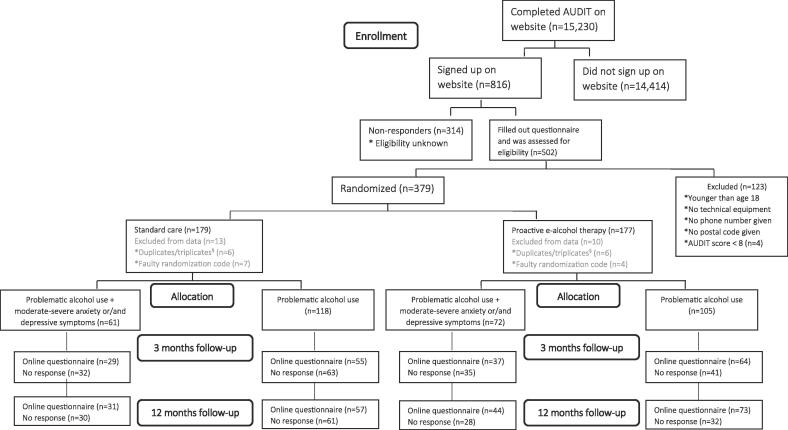Exploring the relationship between proactive e-alcohol therapy and symptoms of anxiety or/and depression: Post-hoc analyses from a randomized controlled trial
IF 2.8
Q1 Psychology
引用次数: 0
Abstract
Background
Individuals with problematic alcohol use often face anxiety and depressive symptoms, which can hinder treatment engagement, compliance, and effectiveness. Psychosocial therapy through video conference (e-alcohol therapy) may reduce these barriers. We explored whether 1) anxiety or/and depressive symptoms modify the effect of proactive e-alcohol therapy on treatment initiation, compliance, and alcohol intake, 2) proactive e-alcohol therapy impacts anxiety or/and depressive symptoms compared to standard care.
Methods
Participants with problematic alcohol use were recruited online and randomly assigned to proactive e-alcohol therapy or standard care. Problematic alcohol use was defined by an 8+ score on the Alcohol Use Disorders Identification Test. Anxiety and depressive symptoms were measured using the Patient Health Questionnaire-4.
Results
356 individuals participated; 133 showed moderate-severe symptoms of anxiety and depression at baseline. There were no significant differences between individuals with and without moderate-severe anxiety or/and depressive symptoms in the effect of proactive e-alcohol therapy versus standard care on treatment initiation (3 mo: p = 0.64; 12 mo: p = 0.97), compliance (3 mo: p = 0.40; 12 mo: p = 0.58), or alcohol intake (3 mo: p = 0.86; 12 mo: p = 0.90). No significant differences were found in the proportion of participants with moderate-severe anxiety and depressive symptoms between the two intervention groups after 3 months (OR 0.6; 95 % CI 0.3 to 1.4; p = 0.27).
Conclusions
We found no evidence that anxiety or/and depressive symptoms modify the effect of proactive e-alcohol therapy on treatment initiation, compliance, or alcohol intake. Proactive e-alcohol therapy matched standard care in reducing anxiety or/and depressive symptoms over a 3-month follow-up.

探索主动电子酒精治疗与焦虑或/和抑郁症状之间的关系:随机对照试验的事后分析
背景:有问题的酒精使用的个体经常面临焦虑和抑郁症状,这可能会阻碍治疗的参与、依从性和有效性。通过视频会议进行的心理社会治疗(电子酒精治疗)可以减少这些障碍。我们探讨了1)焦虑或/和抑郁症状是否会改变主动电子酒精治疗对治疗开始、依从性和酒精摄入量的影响;2)与标准治疗相比,主动电子酒精治疗是否会影响焦虑或/和抑郁症状。方法:在线招募有酒精使用问题的参与者,并随机分配到主动电子酒精治疗或标准护理组。在酒精使用障碍识别测试中,有问题的酒精使用被定义为8+分。使用患者健康问卷-4测量焦虑和抑郁症状。结果:356人参与;133人在基线时表现出中度至重度焦虑和抑郁症状。有和没有中重度焦虑或/和抑郁症状的个体在主动电子酒精治疗与标准治疗开始时的效果方面没有显著差异(3个月:p = 0.64;12个月:p = 0.97),依从性(3个月:p = 0.40;12个月:p = 0.58)或酒精摄入(3个月:p = 0.86;12个月:p = 0.90)。3个月后,两组受试者出现中重度焦虑和抑郁症状的比例无显著差异(OR 0.6;95% CI 0.3 ~ 1.4;p = 0.27)。结论:我们没有发现任何证据表明焦虑或/和抑郁症状会改变主动电子酒精治疗对治疗开始、依从性或酒精摄入的影响。在3个月的随访中,主动电子酒精治疗在减少焦虑或/和抑郁症状方面与标准治疗相匹配。
本文章由计算机程序翻译,如有差异,请以英文原文为准。
求助全文
约1分钟内获得全文
求助全文
来源期刊

Addictive Behaviors Reports
Medicine-Psychiatry and Mental Health
CiteScore
6.80
自引率
0.00%
发文量
69
审稿时长
71 days
期刊介绍:
Addictive Behaviors Reports is an open-access and peer reviewed online-only journal offering an interdisciplinary forum for the publication of research in addictive behaviors. The journal accepts submissions that are scientifically sound on all forms of addictive behavior (alcohol, drugs, gambling, Internet, nicotine and technology) with a primary focus on behavioral and psychosocial research. The emphasis of the journal is primarily empirical. That is, sound experimental design combined with valid, reliable assessment and evaluation procedures are a requisite for acceptance. We are particularly interested in ''non-traditional'', innovative and empirically oriented research such as negative/null data papers, replication studies, case reports on novel treatments, and cross-cultural research. Studies that might encourage new lines of inquiry as well as scholarly commentaries on topical issues, systematic reviews, and mini reviews are also very much encouraged. We also welcome multimedia submissions that incorporate video or audio components to better display methodology or findings.
 求助内容:
求助内容: 应助结果提醒方式:
应助结果提醒方式:


